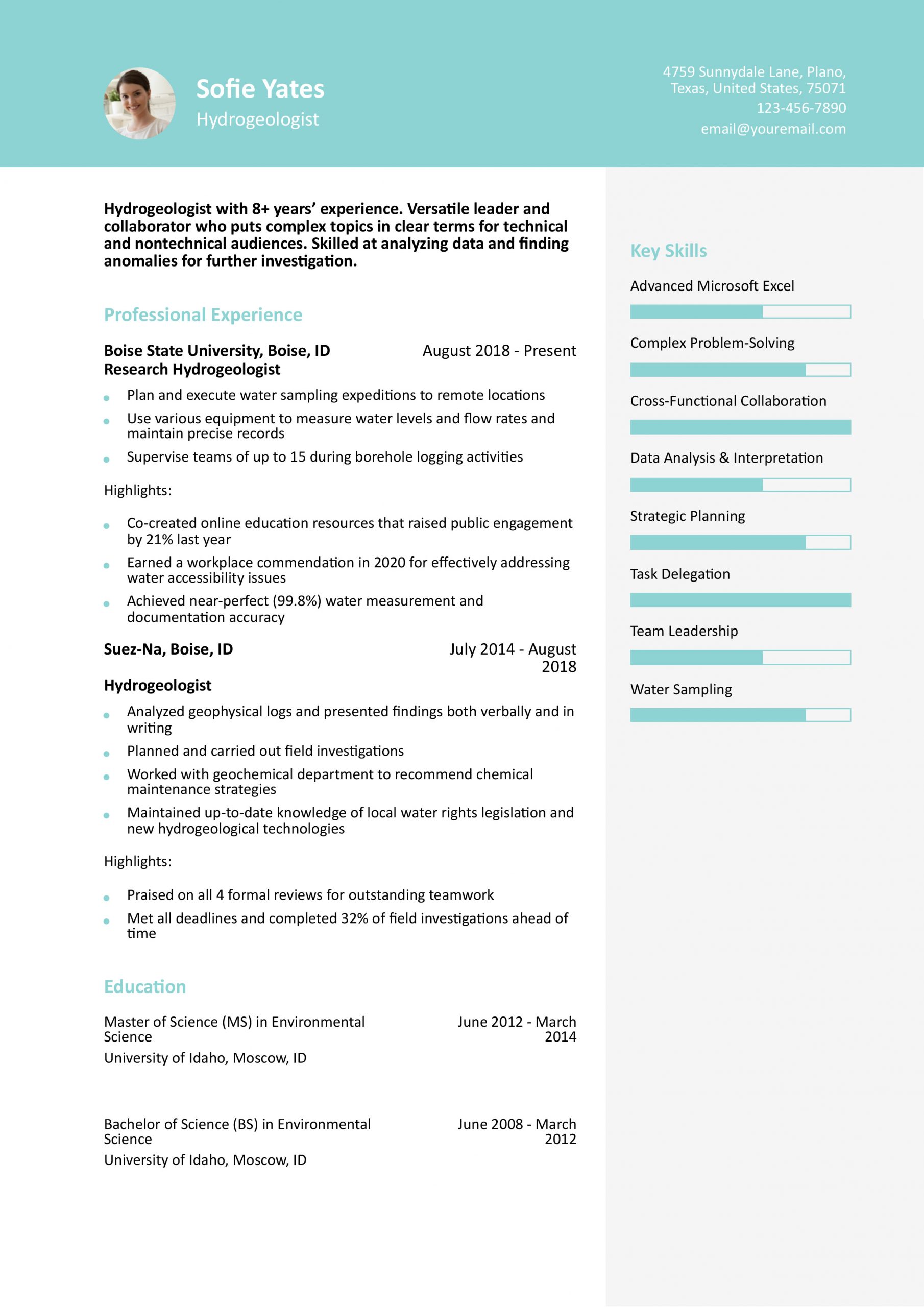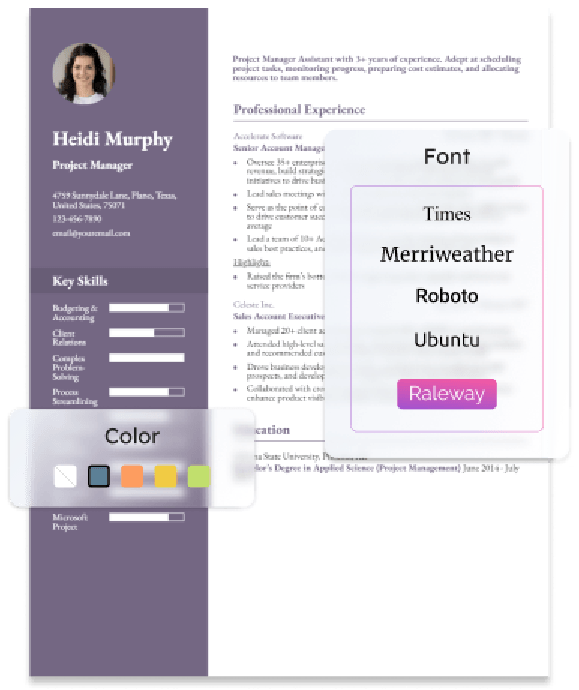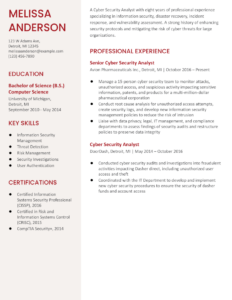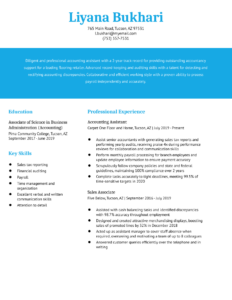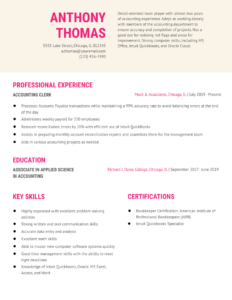How To Write a Science Resume
Science careers span industries and include various specialties, from hydrogeology to physics, health care research and development, and chemistry. When writing a science resume, focus on your area of study, experience, and career goals — and be sure to target the resume to the employer to show your relevance and value as a candidate.
Also, consider highlighting leadership, planning, and communication skills, which are not specific to science but can be important when working in a collaborative lab environment or overseeing lab assistants.
Review our below list of tips, including examples, that can help you level up your resume.
- Entry-level
- Mid-career
- Senior-level
1. Create a profile by summarizing your science qualifications
An engaging snapshot of your science career will draw in hiring managers and show them the value you can bring to their workplace. Start by listing your job title, years of experience, and several specializations that align with the job posting — keep it relevant. Then, present yourself as an expert in your space. For instance, you might write that you have a track record of finding 99% of anomalies because of your problem-solving and analysis skills.
Entry-Level Profile Example
Physicist with nearly two years of experience. Skilled at applying complex concepts and calculations in various environments. Equally effective working solo or on a team. Committed to investigating challenges and finding creative yet practical solutions. Doctor of Philosophy in Physics.
Senior-Level Profile Example
Clinical laboratory scientist with over 12 years’ experience analyzing specimens and developing procedures in health care settings. Combine decisive, supportive leadership style with a talent for strategic planning and deployment. Master of Science in Biochemistry.
2. Add a compelling section featuring your science experience
To create a strong professional experience section for your science resume, describe your career achievements, not just job responsibilities. Employers want to see measurable results, so use relevant numbers to quantify your successes when possible. Demonstrate the bottom-line value of your contributions by including data, metrics, and monetary figures, such as winning $1 million in new contract business or reducing lab waste by 50%.
Consider highlighting your ability to collaborate with cross-functional teams and translate complex technical concepts into accessible language, along with your problem-solving skills. Tout mentorship strengths if you oversee teams, and note any strategic planning experience.
Mid-Career Professional Experience Example
Research Hydrogeologist, Boise State University, Boise, ID | August 2018 to present
- Plan and execute water sampling expeditions to remote locations
- Use various equipment to measure water levels and flow rates and maintain precise records
- Supervise teams of up to 15 during borehole logging activities
Highlights:
- Co-created online education resources that raised public engagement by 21% last year
- Earned a workplace commendation in 2020 for effectively addressing water accessibility issues
- Achieved near-perfect (99.8%) water measurement and documentation accuracy
Senior-Level Professional Experience Example
Lead Clinical Laboratory Scientist, Bozeman Deaconess Hospital, Bozeman, MT | October 2015 to present
- Calibrate lab instruments and serve as an escalation point for complex issues
- Orient new hires and continually train existing staff
- Co-develop and oversee lab procedures, and interrogate results
Highlights:
- Solved 89% of escalated problems within three hours
- Improved staff retention by 34% in three years
- Pinpointed and resolved 98% of anomalies in 2020
- Won a workplace award for excellent teamwork in 2019
3. List your science education and certifications
Aside from a bachelor’s and/or master’s degree in a science specialty, you may have earned certifications that can set your resume apart from competing candidates. While most employers are focused on professional experience, additional credentials could improve your chances of landing an interview.
For instance, a Medical Laboratory Technician (MLT) certification from The National Accrediting Agency for Clinical Laboratory Science shows you understand and practice the latest laboratory best practices and safety measures.
Education
Template
- [Degree Name]
- [School Name], [City, State Abbreviation] | [Graduation Year]
Example
- Master of Science (M.S.) Biochemistry
- University of Michigan, Ann Arbor, MI | 2010
Certifications
Template
- [Certification Name], [Awarding Organization] | [Completion Year]
Example
- Lab Technician Certification, American Society for Clinical Pathology (ASCP) | 2019
4. List your key science skills and proficiencies
Most organizations rely on some form of applicant tracking system (ATS) to identify qualified candidates for job openings. To get your resume through the initial screening process and into the hiring manager’s hands, incorporate keywords from the job posting into your profile, professional experience, and skills section. Below, you’ll find a list of key terms and skills that you may encounter while applying for science positions:
| Key Skills and Proficiencies | |
|---|---|
| Advanced physics | Analysis and imaging software |
| Assays: Blood coagulation factors, enzyme, infectivity, and other assays | Cell fractionation |
| Characterization and purification of enzymes | Complex problem-solving |
| Conjugation | Data gathering and analysis |
| Experiment documentation | Magnetics |
| Managing lab personnel | Mathematics |
| Mutagenesis | Mutation testing |
| Peptide analysis | Problem-solving |
| Public speaking and presentations | Research and development |
| Thermodynamics | |
How To Pick the Best Science Resume Template
When selecting a science resume template, prioritize readability. Ultimately, hiring managers want to learn about your experience and qualifications— they are focused on content, not design. Heavy use of color and graphics can distract readers from what matters most: the value you can bring to their workplace. Look for a template that organizes content effectively, is clean, and uncluttered.
Science Text-Only Resume Templates and Examples
- Entry-level
- Mid-career
- Senior-level
Sofie Yates
(876) 678-8765
[email protected]
323 Sixth Street, Boise, ID 97531
Profile
Hydrogeologist with 8+ years’ experience. Versatile leader and collaborator who puts complex topics in clear terms for technical and nontechnical audiences. Skilled at analyzing data and finding anomalies for further investigation.
Key Skills
- Advanced Microsoft Excel
- Complex Problem-Solving
- Cross-Functional Collaboration
- Data Analysis & Interpretation
- Strategic Planning
- Task Delegation
- Team Leadership
- Water Sampling
Professional Experience
Research Hydrogeologist, Boise State University, Boise, ID | August 2018 to Present
- Plan and execute water sampling expeditions to remote locations
- Use various equipment to measure water levels and flow rates and maintain precise records
- Supervise teams of up to 15 during borehole logging activities
Highlights:
- Co-created online education resources that raised public engagement by 21% last year
- Earned a workplace commendation in 2020 for effectively addressing water accessibility issues
- Achieved near-perfect (99.8%) water measurement and documentation accuracy
Hydrogeologist, Suez-Na, Boise, ID | July 2014 to August 2018
- Analyzed geophysical logs and presented findings both verbally and in writing
- Planned and carried out field investigations
- Worked with geochemical department to recommend chemical maintenance strategies
- Maintained up-to-date knowledge of local water rights legislation and new hydrogeological technologies
Highlights:
- Praised on all 4 formal reviews for outstanding teamwork
- Met all deadlines and completed 32% of field investigations ahead of time
Education
University of Idaho, Moscow, ID
Master of Science (MS) in Environmental Science | 2014
Bachelor of Science (BS) in Environmental Science | 2012
Frequently Asked Questions: Science Resume Examples and Advice
What are common action verbs for science resumes?-
We know it’s easy to get stuck when writing the experience section of a resume. You might start to run out of action verbs to describe your work. These verbs are important because they help hiring managers visualize your contributions and how you work in a science setting and with teams. To help you with this challenge, we put together the below list of common action verbs that can describe science roles.
| Action Verbs | |
|---|---|
| Adapt | Analyze |
| Assess | Calibrate |
| Collaborate | Communicate |
| Dissect | Experiment |
| Implement | Manage |
| Manipulate | Mentor |
| Prepare | Present |
| Report | Research |
| Speak | Study |
| Synthesize | Test |
How do you align your resume with a science job posting?-
According to the Bureau of Labor Statistics (BLS), jobs for clinical laboratory scientists are projected to grow at an average rate of 7% from 2021 to 2031, keeping pace with most other occupations. The environmental science job outlook is 5% growth, according to BLS, though evolving regulations and government funding can always impact the growth of this and other science sectors. Overall, science is a stable industry with a positive outlook for job seekers who are qualified.
Despite steady growth, you must align your resume with the job posting to secure interviews for the most lucrative opportunities with valuable employee benefits. Science can be a competitive field. Tailor your resume to individual job postings so your experience and knowledge stand out and grab the attention of hiring managers. For example, if an employer is looking for a laboratory scientist who can develop procedures and protocols, you’d highlight your experience in that area and describe the outcome of your contributions.
What is the best data science resume format?-
Most job seekers should use the combination (or hybrid) format for their resume. True to its name, this format combines two important features of other resume formats: the chronological format’s experience section and the functional format’s profile section. (The resume examples on this page all use combination format, as do most other resumes on Resume Builder.)
A combination resume offers the best of both worlds by fusing these two features. The experience section lets you overview your recent work history – essential information for most employers. At the same time, the profile section lets you showcase your career highlights at the top, regardless if they’re from that work history or another part of your background. The resulting resume is straightforward yet strategic. It gives hiring managers the clearest possible view of your experience and relevant strengths, so they can decide to call you for an interview.
Craft your perfect resume in minutes
Get 2x more interviews with Resume Builder. Access Pro Plan features for a limited time!

After completing your science resume, write a corresponding cover letter that serves as an introduction and case for why you are an ideal candidate for the job. You can think of the cover letter as a longer form of the profile at the top of your resume. Be sure to customize the cover letter for every job you pursue and relate how your experience and qualifications meet the employers’ needs.
Feeling stuck with writing a cover letter? Read our cover letter guide to learn how. For other related cover letter examples, check out our data scientist and computer science cover letter guides.
